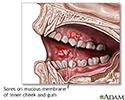Noma
Cancrum oris; Gangrenous stomatitis
Noma is a type of gangrene that destroys mucous membranes of the mouth and other tissues. It occurs in malnourished children in areas where sanitation and cleanliness are lacking.
Causes
The exact cause is unknown, but noma may be due to a certain kind of bacteria.
This disorder most often occurs in young, severely malnourished children from ages 2 to 5 years. Often they have had an illness such as measles, scarlet fever, tuberculosis, or cancer. They may also have a weakened immune system.
Risk factors include:
- A type of malnutrition called Kwashiorkor, and other forms of severe protein malnutrition
- Poor sanitation and dirty living conditions
- Disorders such as measles or leukemia
- Living in a developing country
Symptoms
Noma causes sudden tissue destruction that rapidly gets worse. First, the gums and lining of the cheeks become inflamed and develop sores (ulcers). The ulcers develop a foul-smelling drainage, causing bad breath and skin odor.
The infection spreads to the skin, and the tissues in the lips and cheeks die. This can eventually destroy the soft tissue and bone. The destruction of the bones around the mouth causes deformity of the face and loss of teeth.
Noma can also affect the genitals, spreading to the genital skin (this is sometimes called noma pudendi).
Exams and Tests
A physical exam shows inflamed areas of the mucous membranes, mouth ulcers, and skin ulcers. These ulcers have a foul-smelling drainage. There may be other signs of malnutrition.
Treatment
Antibiotics and proper nutrition helps stop the disease from getting worse. Plastic surgery may be necessary to remove destroyed tissues and reconstruct facial bones. This will improve facial appearance and the function of the mouth and jaw.
Outlook (Prognosis)
In some cases, this condition can be deadly if it is not treated. Other times, the condition may heal over time, even without treatment. However, it can cause severe scarring and deformity.
Possible Complications
These complications can occur:
- Deformity of the face
- Discomfort
- Difficulty speaking and chewing
- Social isolation
When to Contact a Medical Professional
Medical care is needed if mouth sores and inflammation occur and persist or get worse.
Prevention
Improving nutrition, cleanliness, and sanitation may help.
References
Chjong CM, Acuin JM, Labra PJP, Chan AL. Ear, nose, and throat disorders. In: Ryan ET, Hill DR, Solomon T, Aaronson NE, Endy TP, eds. Hunter's Tropical Medicine and Emerging Infectious Diseases. 10th ed. Philadelphia, PA: Elsevier; 2020:chap 12.
Chow AW. Infections of the oral cavity, neck, and head. In: Bennett JE, Dolin R, Blaser MJ, eds. Mandell, Douglas, and Bennett's Principles and Practice of Infectious Diseases. 9th ed. Philadelphia, PA: Elsevier; 2020:chap 64.
Kim W. Disorders of the mucous membranes. In: Kliegman RM, St. Geme JW, Blum NJ, Shah SS, Tasker RC, Wilson KM. eds. Nelson Textbook of Pediatrics. 21st ed. Philadelphia, PA: Elsevier; 2020:chap 684.
Review Date: 4/28/2023







